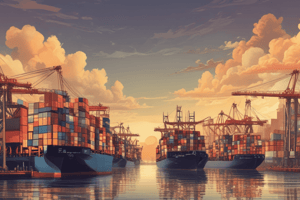Podcast
Questions and Answers
What is the main function of commerce in the economy?
What is the main function of commerce in the economy?
- Limiting the growth and stability of economies
- Creating barriers to trade among nations
- Promoting economic isolationism
- Facilitating the flow of wealth and resources (correct)
How does specialization contribute to commerce?
How does specialization contribute to commerce?
- By discouraging innovation and economic development
- By encouraging individuals and organizations to focus on areas of weakness
- By allowing individuals and organizations to produce goods or services at which they excel (correct)
- By promoting an equal distribution of resources among all producers
What principle is specialization based on in commerce?
What principle is specialization based on in commerce?
- The principle of scarcity
- The law of decreasing returns
- The law of demand
- The principle of comparative advantage (correct)
How does commerce contribute to economic development?
How does commerce contribute to economic development?
What is one benefit of commerce for society?
What is one benefit of commerce for society?
Why do countries engage in trade according to the text?
Why do countries engage in trade according to the text?
What is the primary purpose of trade in commerce?
What is the primary purpose of trade in commerce?
Which policy promotes global efficiency by allowing goods to be produced where they are most competitively made?
Which policy promotes global efficiency by allowing goods to be produced where they are most competitively made?
Who introduced the concept of 'demand and supply' in economics?
Who introduced the concept of 'demand and supply' in economics?
What is the primary aim of protectionism as a trade policy?
What is the primary aim of protectionism as a trade policy?
Which concept helps explain the mechanisms of the market according to Adam Smith?
Which concept helps explain the mechanisms of the market according to Adam Smith?
What fundamental concepts shape our understanding of the global economy?
What fundamental concepts shape our understanding of the global economy?
Flashcards are hidden until you start studying
Study Notes
Commerce: Exploring Its Role in the Economy
Commerce, a vital pillar of human civilization, has been shaping economies for centuries. Let's delve into the nuances of commerce, particularly within the realm of economics, to better understand its significance and how it impacts our world.
Commerce and Economy: A Symbiotic Relationship
Commerce is the exchange of goods and services between individuals, organizations, or nations. It's a fundamental aspect of economics, facilitating the flow of wealth and resources, and playing a key role in the growth and stability of economies.
Through commerce, society benefits from increased production, specialization, and innovation, which fosters economic development. The exchange of goods and services generates wealth and creates opportunities for individuals and businesses to thrive.
Specialization and Comparative Advantage
Commerce lends itself to the concept of specialization, whereby individuals and organizations focus on producing a particular good or service at which they excel. This specialization is based on the principle of comparative advantage, which suggests that the most efficient producer of a good or service should be the one to supply it.
This specialization encourages trade among nations, as countries with a comparative advantage in producing certain goods and services trade with others to obtain goods and services that they cannot produce as efficiently.
The Role of Trade in Commerce
Trade, a central component of commerce, allows countries to import goods and services when they cannot produce them domestically, or when it is more cost-effective to buy from abroad. This trade promotes economic growth, as it leads to increased production, efficiency, and specialization.
International Trade: Free Trade vs. Protectionism
International trade can be approached in two primary ways: free trade and protectionism.
-
Free trade is a policy of minimal restrictions on trade between nations. It promotes global efficiency by allowing goods and services to be produced where they can be produced most competitively, and then traded globally.
-
Protectionism, on the other hand, is a policy that protects domestic industries from foreign competition through import tariffs, quotas, and subsidies. While protectionism may help domestic industries in the short term, it often results in inefficiency and higher prices for consumers.
Commerce and the Development of Economic Theories
Commerce has played a pivotal role in the development of economic theories. For instance, the concept of "demand and supply" in economics was first introduced by Adam Smith in his work "Wealth of Nations," as a way to explain the mechanisms of the market.
More recently, the theories of comparative advantage by David Ricardo, and the concept of "international trade" by Jan Tinbergen, have shaped our understanding of commerce's role in global economics.
Conclusion
Commerce, as an integral part of the economy, provides a unique opportunity to explore topics in economics. Specialization, comparative advantage, and trade are fundamental concepts that shape our understanding of the global economy.
As we continue to examine the role of commerce in our world, we are better equipped to understand the relationships between economics, society, and human development. This knowledge helps us make informed decisions that will promote economic growth and prosperity for all.
Studying That Suits You
Use AI to generate personalized quizzes and flashcards to suit your learning preferences.




